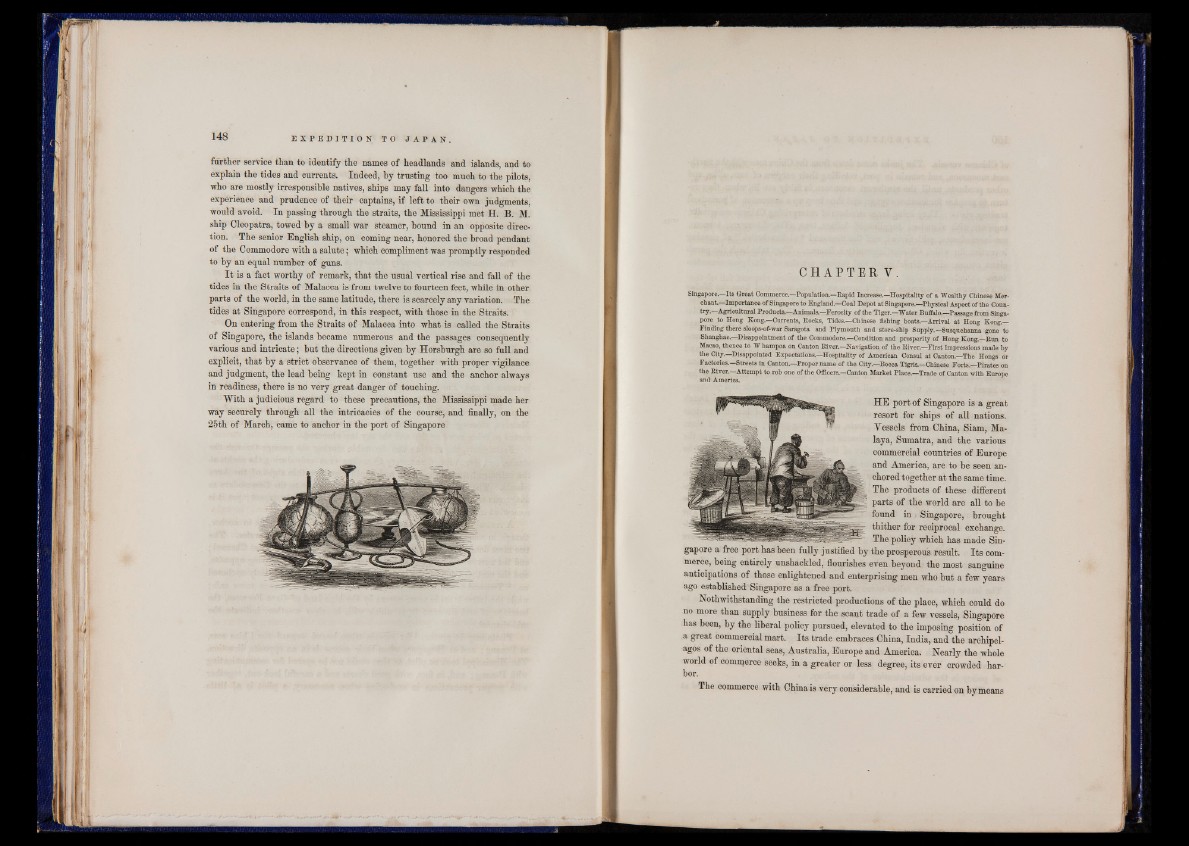
further service than to identify the names of headlands and islands, and to
explain the tides and currents. Indeed, by trusting too much to the pilots,
who are mostly irresponsible natives, ships may fall into dangers which the
experience and prudence of their captains, if left to their own judgments,
would avoid. In passing through the straits, the Mississippi met H. B. M.
ship Cleopatra, towed by a small war steamer, bound in an opposite direction.
The senior English ship, on coming near, honored the broad pendant
of the Commodore with a salute; which compliment was promptly responded
to by an equal number of guns.
I t is a fact worthy of remark, that the usual vertical rise and fall of the
tides in the Straits of Malacca is from twelve to fourteen feet, while in other
parts of the world, in the same latitude, there is scarcely any variation. The
tides at Singapore correspond, in this respect, with those in the Straits.
On entering from the Straits of Malacca into what is called the Straits
of Singapore, the islands became numerous and the passages consequently
various and intricate; but the directions given by Horsburgh are so full and
explicit, that by a strict observance of them, together with proper vigilance
and judgment, the lead being kept in constant use and the anchor always
in readiness, there is no very great danger of touching.
With a judicious regard to these precautions, the Mississippi made her
way securely through all the intricacies of the course, and finally, on the
25th of March, came to anchor in the port of Singapore
CHAPTER Y
Singapore—Its (treat Commerce—Population.—Eapid Increase—Hospitality of a Wealthy Chinese Merchant—
Importance of Singapore to England.—Coal Depot at Singapore.—PhyBical Aspect of the Country.—
Agricultural Products.—Animals.—Ferocity of the Tiger.—Water Sufialo.—Passage from Singapore
to Hong Kong.—Currents, Socks, Tides.—Chinese fishing boats.—Arrival at Hong Kong.—
Finding there sloops-of-war Saragota and Plymouth and store-ship Supply.—Susquehanna gone to
Shanghae.—Disappointment of the Commodore.—Condition and prosperity of Hong Kong.—Bun to
Macao, thence to W hampoa on Canton Biver.—Navigation of the Biver.—F irst impressions made by
the City.—Disappointed Expectations.—Hospitality of American Consul at Canton.—The Hongs or
Factories.—Streets in Canton.—Proper name of the City.—Bocca Tigris.—Chinese Forts.—Pirates on
the Biver.—Attempt to rob one o f the Officers.—Canton Market Place.—Trade of Canton with Europe
and America
HE port of Singapore is a great
resort for ships of all nations.
Vessels from China, Siam, Malaya,
Sumatra, and the various
commercial countries of Europe
and America, are to be seen anchored
together at the same time.
The products of these different
parts of the world are all to be
found in > Singapore, brought
thither for reciprocal exchange.
The policy which has made Singapore
a free port has been fully justified by the prosperous result. Its commerce,
being entirely unshackled, flourishes even beyond the most sanguine
anticipations of those enlightened and enterprising men who but a few years
ago established Singapore as a free port.
Nothwithstanding the restricted productions of the place, which could do
no more than supply business for the scant trade of a few vessels, Singapore
has been, by the liberal policy pursued, elevated to the imposing position of
a great commercial mart. Its trade embraces China, India, and the archipelagos
of the oriental seas, Australia, Europe and America. Nearly the whole
world of commerce seeks, in a greater or less degree, its ever crowded harbor.
The commerce with China is very considerable, and is carried on by means